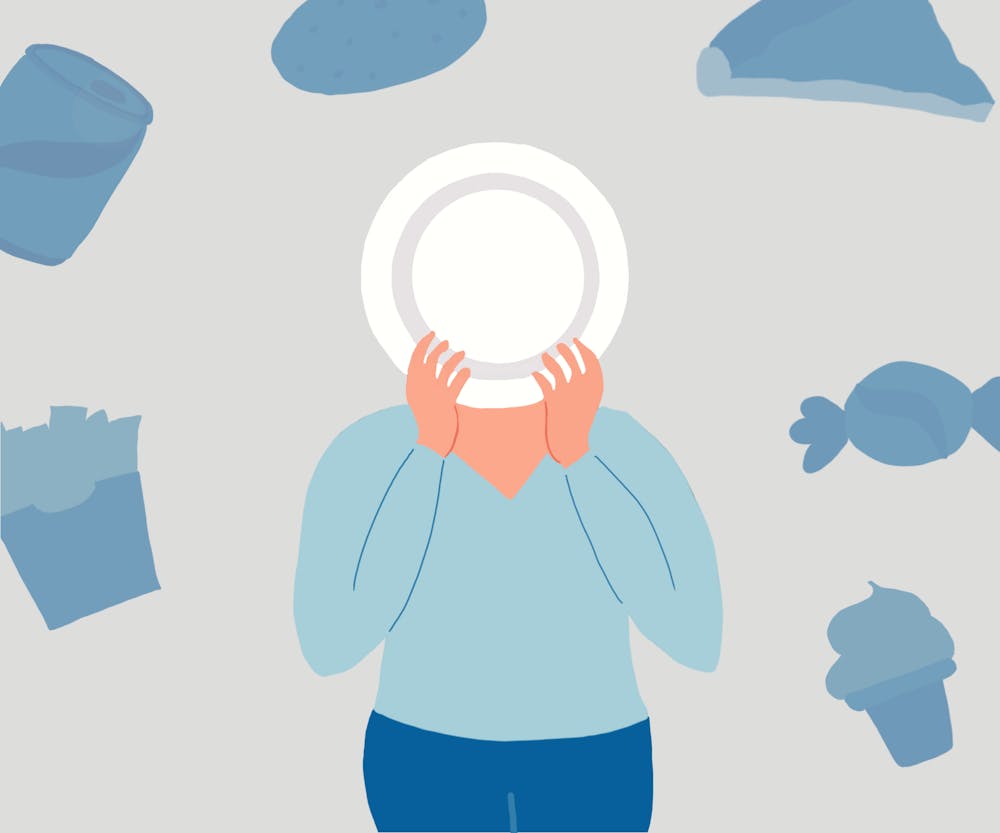While the pandemic has emotionally affected many in the Duke community, it has taken a particularly grave toll on those who are struggling with eating disorders, and in some cases, it has even spurred disordered-eating behaviors.
Since the onset of the pandemic, the Duke Center for Eating Disorders has been inundated with requests for treatment, said Nancy Zucker, founder of the center and associate professor in psychiatry and behavioral sciences. She added that the center has found itself unable to accommodate this sudden increase in demand.
“I think that eating disorders are the most misunderstood psychiatric disorders,” Zucker said. “People think that they’re just about weight and appearance, when really they are about people’s relationship with themselves, how they actually profoundly mistrust themselves, and how they are not good at believing what their body tells them.”
Before the COVID-19 pandemic, young people were already grappling with the insidious effects of social media on body image and self-esteem. With social media users, on average, spending 1-2 additional hours on platforms such as Instagram, Facebook, and Snapchat since the onset of the pandemic, rates of mental health disorders are increasing more than ever.
Particularly at Duke, anxiety-inducing competition often coincides with disordered eating patterns. A 2017 study conducted by the American College Health Association found that Duke undergraduate women are twice as likely as students at other colleges to report being diagnosed or treated by a professional for anorexia.
First-year Victoria Kovarik said that the effects of the portion sizes at dining centers such as the Brodhead Center, the constant stimuli of food, workout culture and fatphobia, along with classes and meetings scheduled at prime eating hours, are detrimental to her progress.
First-year Samantha Miller, a first-year, added that, while these triggering factors aren’t exactly unique to the Duke community, the structure of the West Campus meal plan perpetuates a cycle of self-consciousness surrounding food points.
“At Duke in particular, the amount of food points people are using is usually brought up, especially on the West Campus meal plan,” she said. “Plenty of people talk about how many [points] we have, so if someone has fewer food points, it plays into the idea that a person is eating too much, and can lead to some of those pressures to eat less.”
Miller noted that many of her peers have blacklisted eateries at the Brodhead Center from their diets because of the perceived high calorie and fat content of specific foods.
Associate Professor of Pediatrics Richard Chung noted the impact of the pandemic and campus eating culture on rates of disordered eating at Duke.
“I think that, particularly during the pandemic, given so much demand, it’s been that much harder and, you know, I think there are a lot of questions and thoughts about why that's the case,” he said.
Chung mentioned that staffers have been forced to confront the challenge of resource constraints, particularly during an era of heightened anxiety levels and emotional vulnerability.
Kovarik and Miller reported that the circumstances of the pandemic have exacerbated their disordered-eating behaviors, which began to emerge in high school. Both mentioned that the stay-at-home orders and prolonged social isolation have adversely affected their eating patterns.
Kovarik noted that her relatively standard pre-pandemic meal schedule devolved into a routine of erratic eating patterns and excessive exercise.
“It got to a point over the summer where I would only eat one meal a day and then proceed to bike upwards of 20 miles to offset its effects,” she said.
For Miller, once the pandemic hit, she could no longer conceal her eating disorder, and had to undergo residential treatment prior to attending Duke in the fall.
“Throughout my recovery journey, there have been good periods and bad periods, but what I’ve come to realize is that I will be in recovery for the rest of my life,” she said.
However, the pandemic has not presented a bleak prognosis for all patients with eating-disorders. Zucker has been heartened by several recovery stories. For some, the coronavirus outbreak has served as a profound wake-up call.
“I think I’ve seen it go both ways . . . the bright side is, kind of, a shock in the face in terms of thinking about how vulnerable the immune system is,” she said. “This is a deadly disorder and [COVID-19] is a deadly disease and there’s lots of suffering in the world, so this can be a wake-up call. Like, ‘I’ve really gotta use this pandemic as a chance to radically make different decisions and try to really get healthy so that I can help other people and do other things.’”
Get The Chronicle straight to your inbox
Signup for our weekly newsletter. Cancel at any time.
Halle Friedman is a Trinity senior and an associate news editor of The Chronicle's 119th volume.

